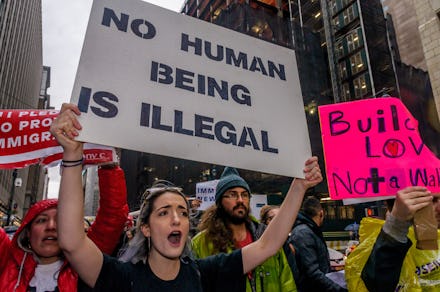Lawyers working to reunite immigrant families say they can't find parents for 545 children

In four years full of controversial moves, the Trump administration's practice of separating migrant children from their parents at the border was among the most upsetting. Although the administration eventually ended the practice and a federal judge ordered the administration to reunite these families, the practice has caused irreparable harm: In addition to potential lasting psychological damage to each separated child, these families may never be reunited at all. Recently, lawyers for the American Civil Liberties Union said they can't locate the parents of over 500 migrant children.
Most people associate family separation with the Trump administration's "zero tolerance" policy implemented in 2018. That year, the ACLU won a court order to reunite thousands of families. The process has been slow going with family separation taking place through at least July 2019 despite the administration formally ending the practice a year before. Earlier this year, a federal judge ordered the Trump administration to prove why it continued to detain migrant children.
However, the administration actually began separating families in 2017 with a "pilot" program along some parts of the southern United States border. On Tuesday, NBC News reported that lawyers from the ACLU said in a court filing that they cannot find the parents of 545 children. Per NBC News, the ACLU and several other organizations are part of a "steering committee" put together by a federal judge in California to locate and reunite families. They learned that over 1,000 families were separated by the Trump administration in 2017, and the lawyers think that about two-thirds of those parents were deported to Central America without their children.
"What has happened is horrific," Lee Gelernt, deputy director of the ACLU Immigrants' Rights Project, which has been leading the litigation, told NPR. "Some of these children were just babies when they were separated. Some of these children may now have been separated for more than half their lives. Almost their whole life, they have not been with their parents."
Even finding the parents doesn't guarantee they'll be reunited with their kids. Gelernt told NBC News that some of the families who have been located want their children to stay in the U.S. with family members or sponsors "due to fear of what will happen to their child if they return."
The traumatic impacts of separating children from their parents for even a short amount of time cannot be understated — it was already seen with World War II. And last year, a report confirmed that the Trump administration's policy resulted in "intense trauma" for migrant children, who often didn't know what happened to their parents. Some children cried "inconsolably," others were catatonic, and the Associated Press reported one 7- or 8-yer-old boy required "emergency psychiatric care" after "[believing] that his dad was killed and he would also be killed."
The exact number of children separated from their families is still unknown, according to a 2019 inspector general report. At the time, the Department of Health and Human Services identified 2,737 children in its care who were separated from their parents, but said there could be "thousands" more.
Justice in Motion, an organization to protect migrant rights, is physically searching for parents in Mexico and Central America, NBC News reported. In a statement, the group said, "While we have already located many deported parents, there are hundreds more who we are still trying to reach. It's an arduous and time-consuming process on a good day. During the pandemic, our team of human rights defenders is taking special measures to protect their own security and safety, as well as that of the parents and their communities."